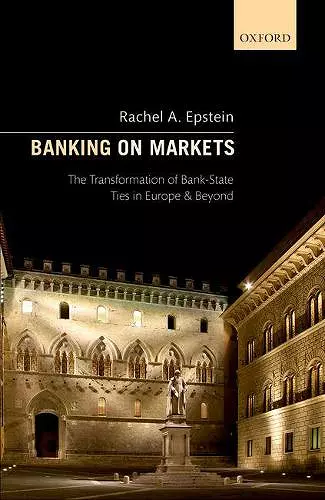Banking on Markets
The Transformation of Bank-State Ties in Europe and Beyond
Format:Hardback
Publisher:Oxford University Press
Published:24th Aug '17
Currently unavailable, and unfortunately no date known when it will be back
This hardback is available in another edition too:
- Paperback£28.49(9780198849698)

Winner of the 2018 Ed A Hewett Book Prize
This volume examines the relationship between banks and states, and how the traditional, political bank-state ties have been transformed.States and banks have traditionally maintained close ties. At various points in time, states have used banks to manage their economies and soak up government debt, while banks enjoyed regulatory forbearance, restricted competition, and implicit or explicit guarantees from their home markets. The political foundations of banks have thus been powerful and enduring, with actors on both sides of the aisle reluctant to sever relations. The central argument of this book, however, is that in the world's largest integrated market, Europe, the traditional political ties between states and banks have been transformed. Specifically, through a combination of post-communist transition, monetary union, and economic crisis, states in Europe no longer wield preponderant influence over their banks. Banking on Markets explains why we have witnessed the radical denationalization of this politically vital sector, as well as the consequences for economic volatility and policy autonomy. The findings in Europe have implications for other world regions, which, to varying degrees, have also experienced intensified pressure on their traditional models of domestic political control over finance. Through an investigation of foreign bank behavior in economic crises, the developmental consequences of political control over banks and the emergence of European Banking Union in the Eurozone, the book advances three main findings. First is that foreign bank ownership need not necessarily lead to economic vulnerability of host states. Second is that marketized bank-state ties do, however, limit pathways to catching up in the global economy. And third is that European Banking Union has strengthened the euro's credibility while cutting down substantially on Eurozone member states' economic policy discretion. This book details the intense political struggles that have underpinned all three outcomes.
... this is an important book, which offers a novel, rich and multi-faceted account of the transformation of the ties between states and banks in Europe. * Dorothee Bohle, EUSA *
Epstein has produced an accessible and comprehensive guide to the structural forces that have directed the evolution of this very important stabilizing transformation. * David L. Cleeton, JCMS *
fascinating study of how the recent economic and financial crisis unfolded in the countries of Central and Eastern Europe. ... It is still too early to tell whether Western European governments will find themselves as estranged from their home-grown financial institutions as are the governments of Central and Eastern Europe. What is clear is that the old relationship between states and banks deserves careful reconsideration. Epstein's book is a critical first step in that direction. * Survival: Global Politics and Strategy *
Professor Epstein has written a highly engaging and accessible account of the changing power dynamics between states and markets, in both eastern and western Europe. She convincingly debunks a number of widespread misconceptions about the political and economic implications of foreign bank ownership. Although focused on the political economy of banking in a European context, this is a work that is bound to become a classic and should be read by all students of political economy. * David Howarth, Professor of Political Economy, University of Luxembourg *
The globalization of finance around the world has transformed the way money is borrowed, debts managed, and economic risks navigated. Banking on Markets offers a much needed exploration of the foreign penetration of formerly insulated banking sectors in Eastern Europe, with surprising findings about the relative robustness this has produced in dealing with the Eurozone crisis. A very helpful guide to a complex set of issues facing the EU, and beyond. * Kathleen McNamara, Associate Professor and Director, Mortara Center for International Studies , Georgetown University *
Banking on Markets brilliantly analyses how the USSR's collapse, European monetary union, and the 2008 global financial crisis have fundamentally transformed bank-state relations in Europe. Through careful argumentation and compelling evidence, Epstein demonstrates that this intensely political process has empowered market actors and made the European banking system more resilient, while at the same time reducing the ability of governments in the poorer European states to use their national banks as development tools to help them catch up with the rest of Europe. Banking on Markets raises challenging questions, provides often unsettling answers, and should be read by everyone concerned with the future of banking and finance in Europe. * Juliet Johnson, Professor of Political Science, McGill University *
- Winner of Rachel Epstein's book ^IBanking on Markets: The Transformation of Bank-State Ties in Europe and Beyond^R is the co-winner of the 2018 Ed A. Hewett Book Prize for an outstanding monograph on the political economy of Eastern Europe, Russia and/or Eurasia. The award is sponsored by the University of Michigan and is awarded by the Association for Slavic, East European, and Eurasian Studies (ASEEES)..
ISBN: 9780198809968
Dimensions: 241mm x 180mm x 21mm
Weight: 514g
232 pages